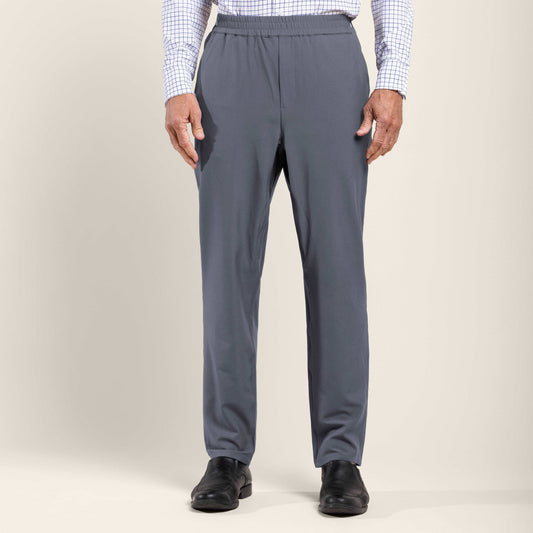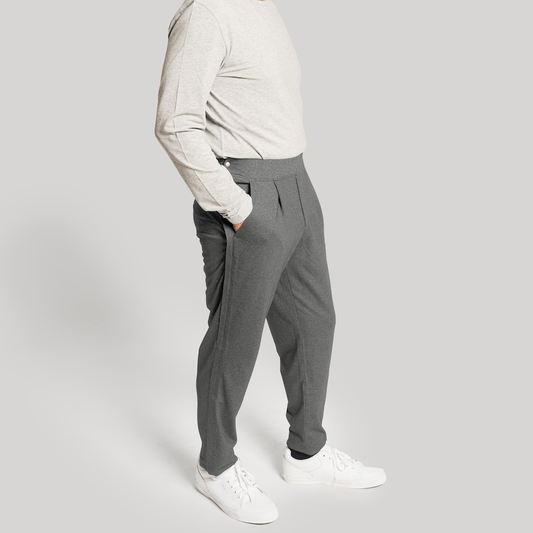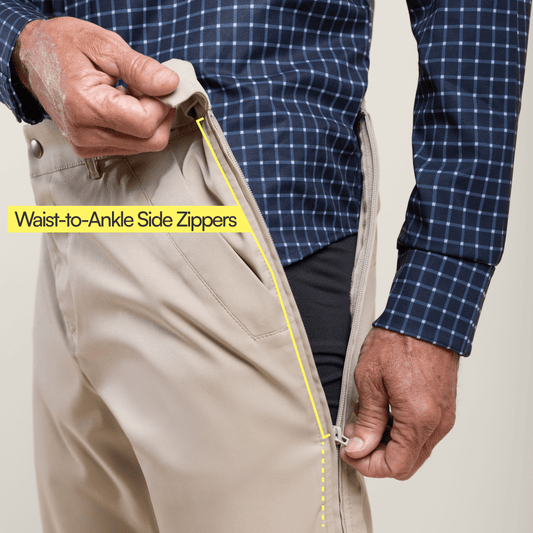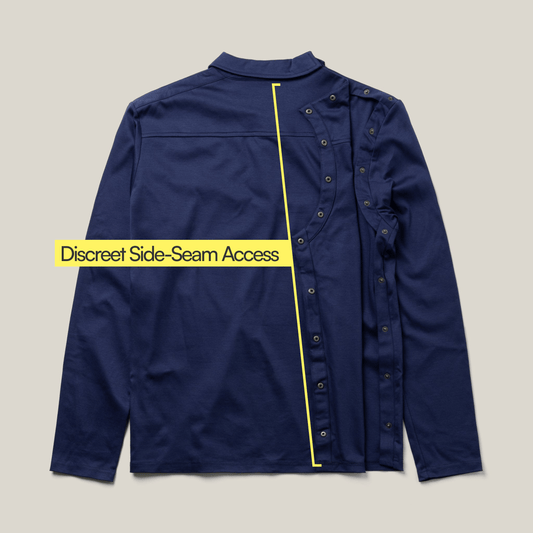What is Adaptive Clothing?
Adaptive clothing for seniors are specially designed to make dressing easier and more accessible for those living with physical and cognitive changes, including limited mobility, reduced motor function, and forms of dementia. These garments often are designed with features such as magnetic closures, adjustable waistbands, and special zippers that can increase accessibility and simplify and ease the dressing process. They’re often made of lightweight materials that not only can be more comfortable than traditional clothing, but also help protect sensitive skin that might tear or become easily irritated.
Quality adaptive clothing for men and adaptive clothing for women balances functionality with style. For those who’ve done some shopping around, you know that too many adaptive garments are anything but discreet. While it’s easy to find adaptive clothing online, it’s much harder to find clothes that your loved ones will actually be excited to wear. But, much is changing in this space. Well-designed adaptive apparel empowers you to continue to wear the clothes that look and feel like you – to maintain your sense of self.
Many adaptive-clothing items are specifically designed around age-related factors, including joint pain, reduced mobility, motor skills, and cognition. The best of these specialized garments allow seniors to maintain their independence and style.
Quality adaptive clothing for seniors makes dressing easier by eliminating the need for buttons, certain zippers, and other complex closures.
Some adults, regardless of the type of clothing they wear, will require some form of dressing assistance from a caregiver. Adaptive clothing can make this process easier, faster, and pain-free for the caregiver as well as the care recipient.
10 Benefits of Adaptive Clothing for Seniors
Here are just 10 benefits to wearing adaptive clothing for seniors:
- Reduce pain when dressing
- Reduce the time it takes for the wearer to get dressed – or a caregiver to help someone get dressed
- Eases getting on on tops by eliminating the need to raise arms over the head or even sliding the head through a hole
- Pulling up pants from a seated or lying position
- Easily change adult briefs without removing pants and shoes
- Use zippers and buttons with one hand
- Clothes such as CareZips for women reduces risk of falls by wearing clothes that go on easily and stay on, eliminating the need to adjust one’s body into a dangerous or painful position in order to get dressed/undressed
- Easier access to catheters, ports and other medical devices
- A better fit for those who use wheelchairs by shortening the front of tops and adjusting waistbands and even location of pockets
- Adaptive tops and adaptive shirts protects sensitive and fragile skin through specific fabric choices
5 Tips for Caregivers To Help Seniors Dress Safely
Helping an older adult get dressed requires not only patience and empathy, but an understanding of physical limitations and risks. But it's a whole lot easier when seniors wear adaptive clothing!
Here are five areas for caregivers to consider when helping seniors dress:
1. Make sure the clothing is comfortable: Older adults may have difficulty moving and putting on clothes, so it is important to ensure that whatever they wear is comfortable and not too tight-fitting. Look for adaptive clothing that’s designed to fit comfortably and allow for a greater range of motion.
- Is the waistband snug but not too snug?
- Are the wrist and ankle openings not overly tight as to impact circulation or movement?
- Does the fabric provide breathability and stretch?
2. Consider the environment:
- Is the temperature (outdoors or indoors) comfortable, and will it change soon? Would layers make it easier to transition to a warmer or cooler temperature?
- Are clothes stain-resistant?
- Is the fabric durable so it can withstand industrial washers and dryers used at care communities?
3. Prioritize safety: Do the clothes fit properly?
- Do shoelaces come undone too easily?
- Do all closures properly function?
- Are there any exposed zippers or tags that could irritate the skin?
4. Simplify the process: Choosing clothing with fewer fastenings and closures.
- Do the pants have elastic waistbands that can eliminate the need of a belt or tie?
- Are the closures easy to use?
- Do the garment’s adaptations actually make dressing easier?
5. Respect their wearer’s preferences: While you may be trying to help your loved one be safe and comfortable, they no doubt will have their opinions on what they want to wear. Listen closely so that you can find clothing that makes them feel comfortable and look like themselves while also keeping them safe.
- What are their favorite colors, patterns, and fits?
- What style of clothing have they always worn – that’s been part of their identity?
- Have you asked them if each item is comfortable and if they are experiencing any pain or irritation?
By following these tips, caregivers can help ensure that seniors are dressed in a way that promotes comfort, dignity, and safety.
How to Choose the Right Adaptive Clothing for Seniors
As detailed above, there are many different factors to consider when shopping for adaptive apparel. Each factor should be individually addressed, including comfort and style. Most important, consider whether the adaptive design improves the dressing process, reduces stress, strain, and pain, and the time it takes to get dressed.
There are a number adaptive-apparel brands on the market specifically for older adults. Many do a great job at making dressing easier. But many of these clothes can often be uncomfortable or drab looking. Other clothes might look and feel great, but don’t actually improve the dressing process.
At Joe & Bella, we sell premium adaptive apparel – high-quality, beautiful clothing designed specifically to ease the dressing process for older adults and their caregivers. With an extensive selection of sizes, styles, and colors, our collection offers clothes designed to extend independent dressing for many, while making the process of assisted dressing quicker, safer, and more dignified for others. Based on our own experience with our parents and grandparents, we’ve brought on talented designers from top technical and leading apparel brands, to create the quickly growing Joe & Bella line. Items like CareZips® Men's Adaptive Pants or Everyday Side-Zip Pant for Women are greater examples of adaptive clothes that meet all the goals – safety, comfort, ease of dressing, dignity, and, of course, style.
But let us know what you think! What do you think are the most important factors when choosing the right clothing for your loved ones?
Joe & Bella's Adaptive Apparel Collections:
Men's Adaptive Clothing | Women's Adaptive Clothing | Men's Adaptive Shirts | Women’s Adaptive Shirts | Men's Adaptive Pants | Women’s Adaptive Pants | Gripper Socks | Side Zipper Pants | Compression Socks | Best Adaptive Clothing | Adaptive Apparel


























































1 comment
Thank you for highlighting the importance of adaptive clothing for seniors. It’s crucial to prioritize their comfort and dignity, and these clothing options truly make a difference in their daily lives. Your insights are valuable in spreading awareness about this essential aspect of elderly care.